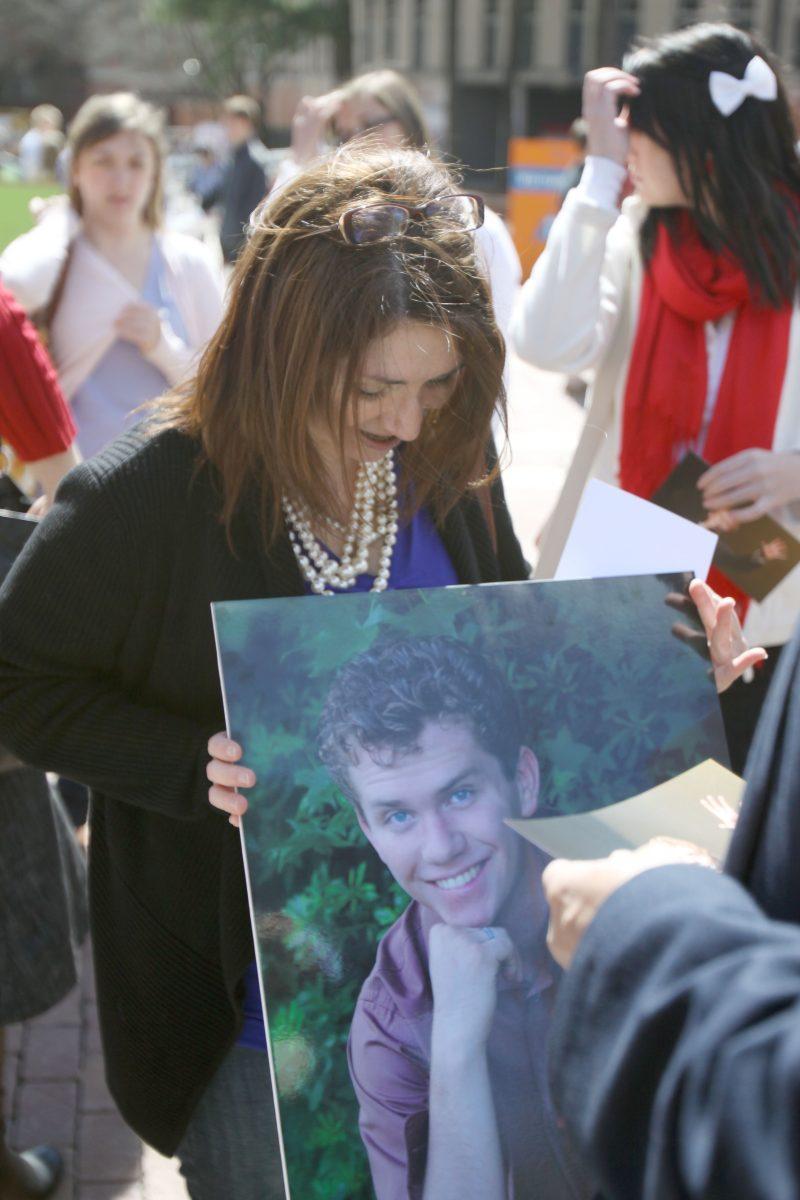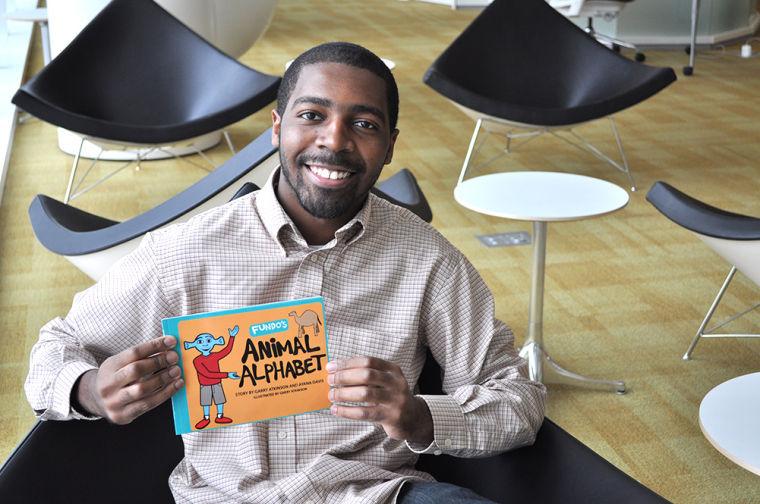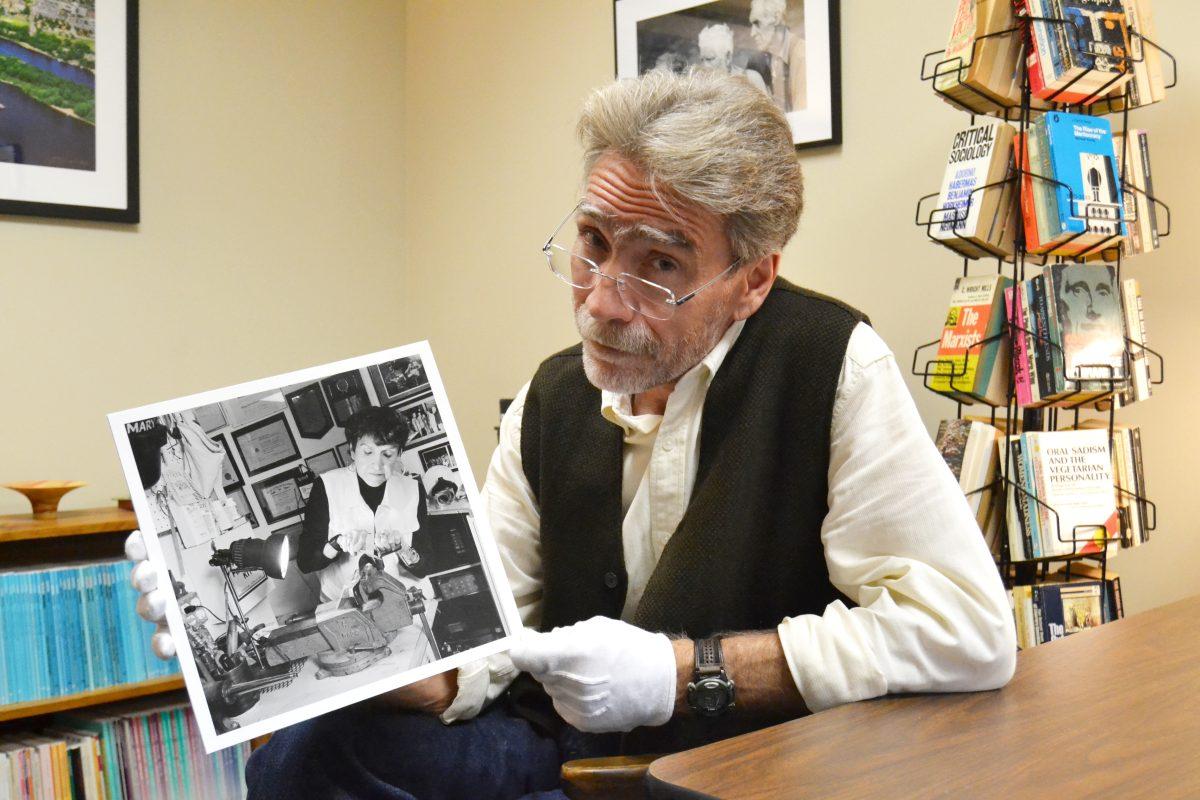In the spotlight and one on one, Ian Peterson made people stop, watch, listen and remember. The college senior, who was 6 feet 2 inches tall with untamed curly hair, stood out as a performer — singing was his forte and dancing was his hobby. Cindy Peterson, his mother, described him as an invincible 21-year-old, with a bright future ahead of him — even though he had cancer.
“He was not the kid to just sit around and let things just happen,” Cindy said. “And so, there was every expectation from the diagnosis that he’d get well.”
While working multiple jobs at the same time, singing in N.C. State’s premier men’s a cappella group and shag dancing in his free time, Cindy said Ian was unstoppable. Even when he was diagnosed with cancer, Ian tried to keep up his fast pace when he had the strength.
But after a five-month struggle against advanced Burkitt’s lymphoma, a cancer of B-lymphocyte white-blood cells of the immune system, Ian died Feb. 27 while fighting off an acute strep infection for nearly a month.
Cindy said Ian took his same spirit for life toward his fight against cancer. A boy his mother describes as “easy on the eyes,” Ian charmed people even when he was sick — a young nurse slipped him her phone number once.
When doctors told Ian he had cancer Oct. 3, Cindy said he didn’t know immediately how to react. Within that same visit, the doctor had to pump Ian with two liters of saline to prevent his kidneys from failing. Cindy said it all happened too fast.
But to fight a war, Ian had to pick an enemy, and when Ian returned to his family’s Cary home from his first visit to the hospital, he and Cindy got their battle plan together.
“I said, ‘I think we should name the cancer,’” Cindy suggested. “We can have this tangible thing to hate.”
A few minutes later, Ian came up with a name.
“I’m going to name her Bessie,” Ian proposed.
Looking at her son in the eyes, Cindy responded, “Well we’re going to kick Bessie’s a**.”
Big man on campus
Many students knew Ian as the guy who could sing, the person who dominated solos during a cappella concerts. He walked around campus with a skip to his step, and he would hum melodies on his way to class.
Ian became involved in singing while he was in high school drama — he had the lead roll in Oklahoma as a ninth-grade student — and when he decided to come to the University to study public relations, wanted to shift his focus to music.
“He was born to perform, but he didn’t want to study drama in college,” Cindy said. “He was a schmoozer. He could just walk into a room of random people and start a conversation.”
During his freshman year of college, Ian auditioned for the Grains of Time, N.C. State’s most visible a cappella group, and got a spot on the squad. The charisma he had in person shined on stage, and he became president of the Grains of Time his junior year.
While in college, Ian took up dancing as a hobby, and partnered with his friend, Sarah Craven.
“We would always go dancing together,” Craven said. “He would come over to my place and vice versa. We went salsa dancing, we’d do swing, we’d do shag. We’d do everything.”
Ian’s showy style and prowess on the dance floor — he frequented North Hills Mall and T.J.’s Shag Club — caught the attention of many, and Cindy recalls random people in public asking him if he were a dancer.
“His drive, his schmoozer personality and him being kind of cute — the girls were coming out of the woodwork — led to his popularity,” Cindy said. “He never wanted to be famous, though. He was sociable, but he was humble, too.”
Even when Ian was sick, he’d make time for friends and tried to keep up with dancing.
“I wasn’t going to treat him differently just because he had cancer,” Craven said. “He wouldn’t have wanted that anyway. He and I would still make plans to hang out. We went dancing several times when he was feeling well. All be it we had to cancel a lot plans because he didn’t have the energy or he fell asleep from the medicine he was on.”
Bessie and chemo
To treat Burkitt’s lymphoma, doctors place patients on eight rounds of chemotherapy spaced 21 days apart. Ian’s doctors don’t know how his cancer came about, and the diagnosis was at first mistaken to be Philadelphia acute leukemia.
Doctors placed Ian on chemotherapy right away after his diagnosis, and after treating him at UNC Hospitals’ oncology ward, doctors transferred Ian to Rex Hospital. For the next five months, Ian was in and out of the hospital with round after round of chemotherapy.
“When he got out of chemotherapy rounds, he looked like a prison-camp victim — he lost a lot of weight,” Cindy said. “The time between rounds was 21 days, but as his immune system got weak, it would take him longer and longer to get ready for the next round.”
As Ian was immunosuppressed after chemotherapy, he was forced to spend time in isolation, away from friends, to ward off infections.
“His body was betraying him, and he asked me one night, ‘What did I do wrong?’” Cindy said. “He was 21, but he was asking bigger questions. He had to. And we left him alone twice in the five months he was sick — we had a lot of alone time with him. Every patient needs and advocate, and we were there to help him fight.”
The Peterson family embraces its faith overtly, and Ian’s parents work for the religious group Cru. As a child, Ian grew up in the Ukraine and Hungary as the son of missionary parents.
“When you’re 21, you’re invincible, but in his case he was faced with his mortality. The last five months of his life, there was a lot of soul searching and returning to his Christian-faith experience.”
While Ian was in the hospital, Cindy said Ian’s friends made an effort to visit him, but at times she had to limit his exposure.
“My first thought was ‘I gotta go there, I gotta visit him,’ but I knew that I couldn’t because he was sick,” Craven said. “I knew that especially working in an ambulance — I’m an EMT — I could have stuff on me that could make him more sick.”
After six chemo treatments, Ian seemed to be on track to complete his eight rounds of therapy — until he spiked a fever Feb. 5.
Cindy was advised to take Ian to the hospital if his temperature got above 100.4 degrees. His temperature that night was 103 degrees, and Cindy and Ian went straight to the oncology ward, bypassing the unsanitary environment of the emergency room. He had to be rushed in to his room in a wheel chair.
The next day, doctors placed Ian in the intensive care unit and kept him heavily sedated to conserve his energy to fight his infection. Though he was medicated, he was still conscious and had daily contact with his caregivers.
For the 22 days Ian was in the ICU, a parent was with him. Cindy or his father John bent hospital visitation rules and slept in a chair by his side at night.
The Grains of Time came to the hospital while Ian was in the ICU to lift his spirits. Brennan Clark, a sophomore in mathematics and math education and member of the group, remembers singing for Ian as one of his last memories of his friend who he considered a role model.
“We sang ‘Lean on Me,’ and during that song I think we all felt his energy with us, like he was singing with us,” Clark said. “We were all crying by the end of that song, and it was just a beautiful moment. We sang a few more songs and we said our goodbyes to him.”
On Feb. 27, Ian’s family was present in his hospital room for his final breath.
“From the time he was a little boy, he knew he was loved, and we didn’t leave his side,” Cindy said. “We were his advocates up until the very end.”
His resonant memory
For the Peterson family, the dust is still settling. The month of February took a severe toll on the family, and the Petersons are still trying to find normalcy.
“We went back and forth from the hospital so many times, I have mismatched shoes. I have pairs I cannot even find,” Cindy said.
Ian’s oldest sister, Ashley, was to be married three days after Ian’s death. Respecting his wishes, the family went forward with the wedding.
March 10, the Petersons held a celebration of Ian’s life after his memorial service at the Summit Church in Durham, which attracted more than 800 of his friends, family and hospital workers.
“Losing a child has got to be the most hellish thing on earth. I can’t imagine anything worse,” Cindy said. “But I’m not grieving with no hope. There is an expectation that I will see him one day again. Dying at 21 rocks a community — it rocked our world. It’s just so early in the unpacking process.
“Again, I’m just trying to find my shoes.”





